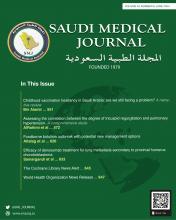Review ArticleReview Article
Open Access
Childhood vaccination hesitancy in Saudi Arabia: are we still facing a problem?
A narrative review
Abdulrahman A. Bin Alamir
Saudi Medical Journal June 2024, 45 (6) 551-559; DOI: https://doi.org/10.15537/smj.2024.45.6.20240116
Abdulrahman A. Bin Alamir
From the Department of Pediatrics, College of Medicine, Majmaah University, Majmaah, Kingdom of Saudi Arabia.
MD
References
- 1.↵Ten threats to global health in 2019. [Updated 2019; accessed 2024 Jan 12]. Available from: https://www.who.int/news-room/spotlight/ten-threats-to-global-health-in-2019
- 2.↵
- 3.↵
- Gidengil CA,
- Parker AM,
- Zikmund-Fisher BJ
- 4.
- 5.
- Larson HJ,
- Jarrett C,
- Eckersberger E,
- Smith DM,
- Paterson P
- 6.↵
- 7.↵
- 8.
- Bhutta ZA,
- Sommerfeld J,
- Lassi ZS,
- Salam RA,
- Das JK
- 9.↵
- 10.↵
- 11.↵Ministry of Health. Saudi Arabia. [accessed 2024 Jan 12]. Available from: https://www.moh.gov.sa/en/Pages/Default.aspx
- 12.↵
- AlGoraini YM,
- AlDujayn NN,
- AlRasheed MA,
- Bashawri YE,
- Alsubaie SS,
- AlShahrani DA
- 13.↵
- 14.↵
- Alruwaili AAS,
- Abo El-fetoh NM,
- Alruwaili TAS,
- Alanazi WAS,
- Alhazmi HHR,
- Alanazi NAB, et al.
- 15.↵
- Alabadi M,
- Aldawood Z
- 16.↵
- 17.
- Whyte EM,
- Mulsant BH,
- Butters MA,
- Qayyum M,
- Towers A,
- Sweet RA, et al.
- 18.↵
- Benin AL,
- Wisler-Scher DJ,
- Colson E,
- Shapiro ED,
- Holmboe ES
- 19.↵
- Fredrickson DD,
- Davis TC,
- Arnould CL,
- Kennen EM,
- Hurniston SG,
- Cross JT, et al.
- 20.↵
- Alshammari TM,
- Subaiea GM,
- Hussain T,
- Moin A,
- Yusuff KB
- 21.↵
- Alzahrani AA,
- Alghamdi AN
- 22.↵
- Rehman S,
- Rehman N,
- Li Z,
- Zhang Y
- 23.↵
- Iqbal MS,
- Khan MN,
- Qamer S,
- Khan SU
- 24.↵
- Majzoub RA,
- Alrofaie OH,
- Almotreb LK,
- Alateeq SK,
- Bin Obaid FR
- 25.↵
- Ashour HA,
- Alhinti SF,
- Hawsaoi SA,
- Alsuwailem AA,
- AlFarhan A,
- Abdulmajeed I
- 26.↵
- Alhuzaimi AN,
- Alrasheed AA,
- Al-Eyadhy A,
- Aljamaan F,
- Alhasan K,
- Batais MA, et al.
- 27.↵
- Almuqbil M,
- Al-Asmi R,
- AlRamly S,
- Hijazi N,
- Alotaibi H,
- AlMubarak A, et al.
- 28.
- Albaker AR,
- Azer SA,
- AlKhorayef M,
- Dakheel NKB,
- AlMutairi S,
- AlHelal S, et al.
- 29.↵
- Almalki OS,
- Alfayez OM,
- Al Yami MS,
- Asiri YA,
- Almohammed OA
- 30.↵
- Almansour A,
- Hussein SM,
- Felemban SG,
- Mahamid AW
- 31.↵
- Alaamri O,
- Okmi EA,
- Suliman Y
- 32.↵
- Aedh AI
- 33.↵
- Khatatbeh M,
- Albalas S,
- Khatatbeh H,
- Momani W,
- Melhem O,
- Al Omari O, et al.
- 34.↵
- 35.
- Alnasser Y,
- Alnamnakani MA,
- Abuhaimed JM,
- Alshiha LZ,
- Alhamid NM,
- Alalshaikh GA
- 36.↵
- Alsubaie SS,
- Gosadi IM,
- Alsaadi BM,
- Albacker NB,
- Bawazir MA,
- Bin-Daud N, et al.
- 37.
- Albarakati R,
- Almatrafi L,
- Fatta G,
- Fatani B,
- Alhindi Y
- 38.↵
- Alqahtani S,
- Alshammary M,
- Alruwaili AD
- 39.↵
- Alfageeh EI,
- Alshareef N,
- Angawi K,
- Alhazmi F,
- Chirwa GC
In this issue
Childhood vaccination hesitancy in Saudi Arabia: are we still facing a problem?
Abdulrahman A. Bin Alamir
Saudi Medical Journal Jun 2024, 45 (6) 551-559; DOI: 10.15537/smj.2024.45.6.20240116
Jump to section
Related Articles
- No related articles found.
Cited By...
- No citing articles found.





